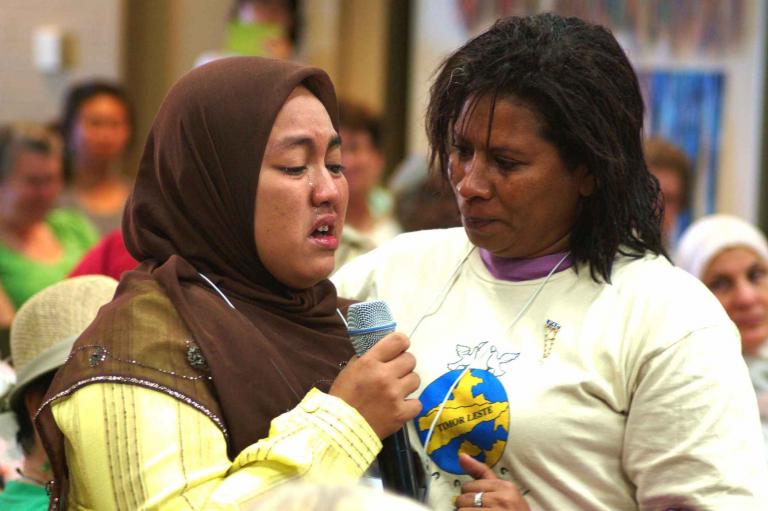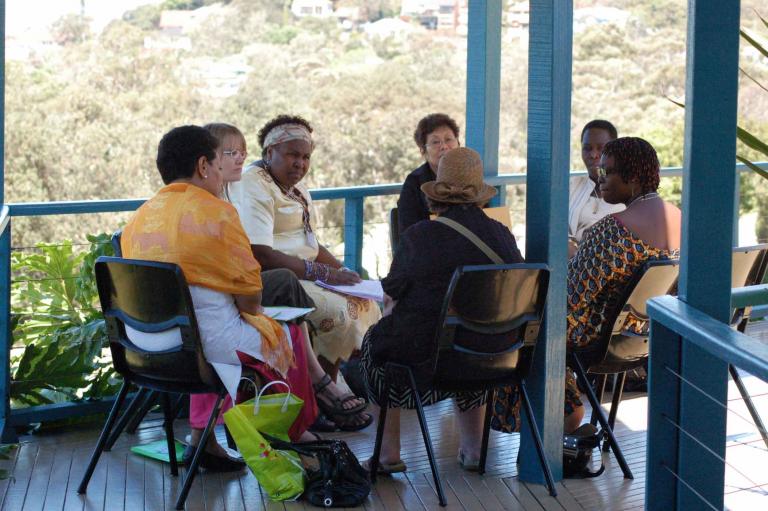Creators of Peace panel (Photo: Mike Brown)The 5th Creators of Peace International Conference took place in Sydney, Australia, 30 September – 4 October. A programme of Initiatives of Change, Creators of Peace is a women’s initiative which challenges and empowers women to become active peace-makers. It works partly through the methodology of ‘Peace Circles’ which have been trialed or established in 25 countries around the world. This conference brought some of these women together. Rebekah Brown reports:
From the moment delegates started arriving at The Collaroy Centre, on Sydney’s stunning north coast, there was a buzz in the air – the kind of energy that is generated when 235 women from over 30 countries, come together to share their hearts and lives. We had gathered together to attend the 5th Creators of Peace International Conference which was all about exploring 'Creating a Culture of Peace – what will it take?'
At dusk we gathered on the sloping lawn, overlooking Collaroy Beach, to take part in an Aboriginal 'smoking ceremony and acknowledgement of country'. It was a wonderful way to start the conference: standing together, side-by-side in a circle, feeling a sense of kinship and being welcomed so graciously by our Indigenous sisters in a way that spoke volumes of their generosity of spirit.
Later that evening we were challenged by the power of truth-telling as the New South Wales Minister for Community Services, Linda Burney, gave the stark statistics of disadvantage among Indigenous women and children. A member of the Wiradjuri nation, Linda was the first Aboriginal person to be elected to the NSW State Parliament.
Day 2 kicked off with a wonderful reflection on the art of listening with Kay Lindahl, founder of The Listening Centre in California. Flying in for the conference, Kay shared the many insights she has gained in her 15 years of work in this area. We learnt that listening is always a choice but that it’s also a gift. As the Quaker author Douglas Steere puts it: 'To ‘listen’ another’s soul into a condition of disclosure and discovery may be almost the greatest service that any human being ever performs for another.'

In a plenary session on 'what destroys peace and what builds peace' – Filomena Dos Reis, a poet and women’s advocate from Timor-Leste, told how she had struggled for five years 'to overcome my feelings' after the disappearance of her husband during the conflict in her country. Since then she has worked for restorative justice. 'If you live with your hatred and anger, you block yourself off from others,' she tells her daughters. 'We have to deal with the past as a teacher, to learn things for the future.' After she had spoken, a moving reconciliation took place with the Indonesian women present, bringing tears and embraces. In the following days, as regional groups met, Indonesians and Timorese combined their efforts in planning to carry forward the process of Creators of Peace Circles.
Mary Lean from the UK talked us through the importance of inner listening – or as she put it 'paying attention to the true self' and the role it can play in peace creation. We heard that 'silence is a nesting place for hope' (Wendy Robinson) and that waiting is all part of it. When asked to complete the sentence 'Silence is…', women responded with various words – 'uncomfortable', 'confronting', 'a time to connect', 'a transformative space'. Silence, we learnt, is perhaps our greatest tool in becoming the creators of peace we long to be.
We heard from many inspirational women such as Mahboba Rawi from Afghanistan who, despite her own personal tragedies, set up a charity called 'Mahboba’s Promise' which supports thousands of orphans in and around Kabul. She shared with us the pain of watching her beloved country torn apart by Russian occupation. Zhanna Petrukovich, a young Russian woman, took the opportunity to apologise to Mahboba for the actions of her country – the first time Mahboba had heard any Russian apologise.

Throughout the conference we were honoured to hear many stories from the First Australians, women who have had so much taken from them – language, culture and in some cases family – and yet are willing to forgive. In the words of Indigenous woman, Walda Blow, 'I need peace in my own life before I can promote peace in the lives of others.'
At a public meeting on the Saturday afternoon, the auditorium filled to capacity to hear several extremely accomplished women speak about their commitment to creating this culture of peace in communities, homes and their own lives. Women such as Barbara Perry, Minister for Local Government in the NSW Parliament, who shared how her faith has taught her that we are to be the salt and light of the world, called to live beyond ourselves. Lina Hamade, co-founder of Linlataki, spoke about the movement bringing dialogue between Muslims and Christians in Lebanon. (Download in PDF Lina Hamade's presentation here). Anna Kima, deputy chairperson of the South Sudan Government's DDR programme, shared gripping stories of women forcing their men to dialogue during the conflict in Sudan, and Jean Brown, initiator of the Creators of Peace circles, challenged women to accept the huge responsibility they have 'for creating peace or perpetrating conflict through what we tell our children'.
Throughout the conference the word 'forgiveness' came up repeatedly, like 'a golden thread weaving through every session'. So it was only fitting that the final reflection was on 'the power of forgiveness/apology'. Rwandan woman, Didacienne Mukahabeshimana, told the astounding story of how she moved from bitterness and hatred towards the perpetrators who killed her family, to caring for them and even creating 'Umuhuza', an NGO which helps rehabilitate prisoners and the families of all those affected by the genocide.
As the conference drew to a close, the delegates one by one revealed the experience that had been most transformational for them. Many commented on the sacredness of the story-sharing, some identified areas in their life needing healing; others spoke of the freedom they had found in forgiveness. One delegate put it like this: 'Often in our everyday lives we don’t see each other or know one another but during this conference we’ve really looked into each other’s eyes – into each other’s hearts... I see God in each one of you and I hope you see God in me.'
So what will it take to create a culture of peace? A willing heart, listening to understand, the courage to forgive and perhaps most of all the vision to see things, not as they are now, but how they could be. This week was a glimpse of just that.
PDF presentations available for download:
Chea Vannath on Creating a Culture of Peace - What it Takes
Chea Vannath on Experiences Combating Corruption
Lina Hamade on the “Li-Naltaqi” Movement
A full colour report will be published and can be ordered from IoC Centres.

